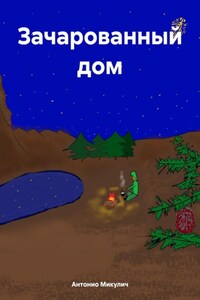I need, I believe, do little more herein, than state that the following pages were written on the road, on the coupé of my caravan, and from day to day. First impressions, it must be admitted, are not always infallible, but they are ever fresh.
I have written from my heart, as I saw and thought; and I shall consider myself most fortunate and happy if I succeed in making the reader think in a measure as I thought, and feel as I felt.
It is but right to state that many of the chapters have appeared in The Leisure Hour.
Some of the illustrations are from photographs kindly lent me by Messrs Valentine and Sons, of Dundee; others from rough sketches of my own; while the frontispiece, “Waiting till the Kettle Boils,” is by Mr Eales, of Twyford.
Gordon Stables.
The “Wanderer” Caravan, Touring in Yorkshire, August 1886.
Chapter One.
Introductory – Written Before Starting
No man who cannot live in his house on wheels, cook, eat, and sleep in, on, or under it, can say that he is cut out for a gipsy life. But to do this you require to have your temporary home well arranged – a perfect multum in parvo, a domus in minima. The chief faults of the old-fashioned caravan are want of space – two ordinary-sized adults can hardly move in it without trampling on each other’s toes – general stuffiness, heat from sky or stove, or probably both combined, and a most disagreeable motion when on the road. This latter is caused by want of good springs, and errors in the general build.
“The man who is master of a caravan,” says a writer, “enjoys that perfect freedom which is denied to the tourist, whose movements are governed by the time-table. He can go where he likes, stop when he lists, go to bed at the hour which suits him best, or get up or lie daydreaming, knowing there is not a train to catch nor a waiter’s convenience to consult. If the neighbourhood does not suit the van-dweller, all he has to do is to hitch in the horses and move to more eligible quarters. The door of his hotel is always open. There is no bill to pay nor anybody to ‘remember;’ and, if the accommodation has been limited, the lodger cannot complain of the charges. In a caravan one has all the privacy of a private residence, with the convenience of being able to wheel it about with a facility denied to the western settler, who shifts his ‘shanty’ from the ‘lot’ which he has leased to the more distant one which he has bought. In the van may, for all the passer-by can discover, be a library and drawing-room combined, or it may be bedroom and dining-room in one, though, as the pioneers in this mode of touring sleep under canvas, we may presume that they find the accommodation indoors a little stuffy.”
Now, this sounds very well, but at the present sitting I have my doubts if a gipsy’s – even a gentle-man-gipsy’s – life be altogether as independent and sunshiny as the sentences represent them to be.
About going where he likes, for instance? Are there not certain laws of the road that forbid the tarrying by the way of caravan folks, for a longer period than that necessary to water and feed a horse or look at his feet? By night, again, he may spy a delightfully retired common, with nothing thereon, perhaps, except a flock of gabbling geese and a superannuated cart-horse, and be tempted to draw up and on it, but may not some duty-bound police man stroll quietly up, and order him to put-to and “move on?”
Again, if the neighbourhood does not suit, then the caravan-master may certainly go elsewhere, if the horses be not too tired or dead lame.
To be sure, there is inside a caravan all the privacy to be desired; but immediately outside, especially if drawn up on a village common, it may be noisy enough.
As regards going to bed and getting up when he pleases, the owner of a caravan is his own master, unless he chooses to carry the ideas and customs of a too-civilised life into the heart of the green country with him, and keep plenty of company.
Methinks a gentleman gipsy ought to have a little of the hermit about him. If he does not love nature and quiet and retirement, he is unsuited for a caravan life, unless, indeed, he would like to make every day a gala day, and the whole tour a round of pleasurable excitement – in other words, a farce.
It is, however, my impression at the present moment that the kind of life I trust to lead for many months to come, might be followed by hundreds who are fond of a quiet and somewhat romantic existence, and especially by those whose health requires bracing up, having sunk below par from overwork, overworry, or over much pleasure-seeking, in the reckless way it is the fashion to seek it.
Only as yet I can say nothing from actual experience. I have to go on, the reader has to read on, ere the riddle be solved to our mutual satisfaction.














